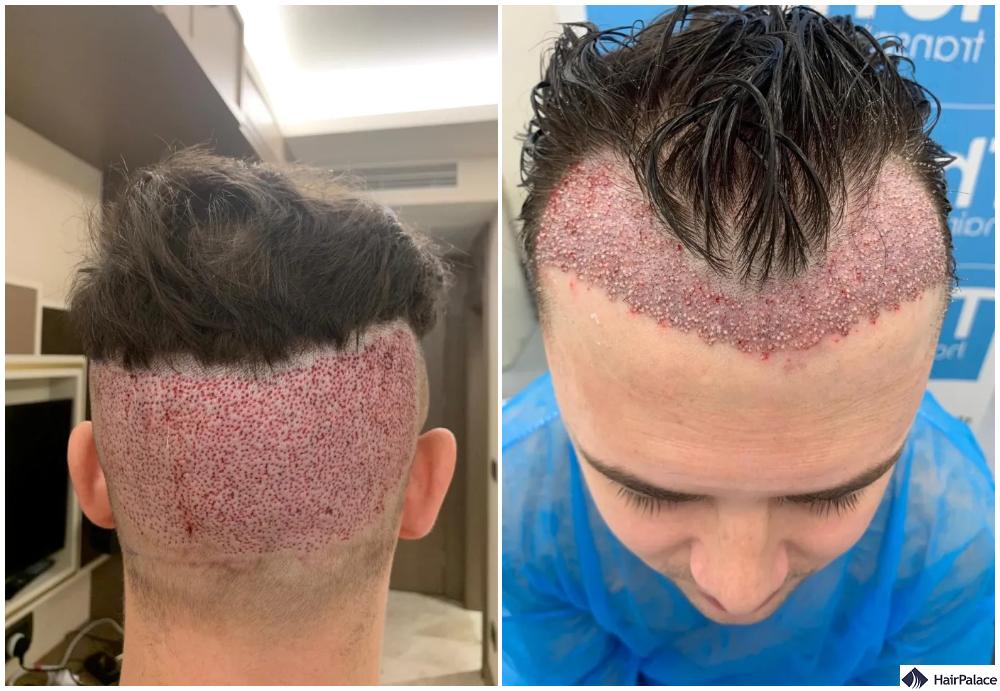
In recent years, Turkey has emerged as a global hotspot for medical tourism, particularly in the field of cosmetic procedures. Among these, hair transplants have become the most sought-after service for British men and women dealing with hair loss. With prices as low as £2,000 compared to £8,000-£10,000 in the UK, it’s no surprise that thousands of Britons make the journey each year hoping to regain their confidence at a fraction of the domestic cost. However, beneath the glossy advertisements and influencer endorsements lies a growing body of evidence warning that not all that glitters is gold. This report is based on the Telegraph.co.uk article.
The Lure of Low Prices
The allure of a cheaper alternative can be intoxicating. Turkey’s clinics often bundle hair transplants with luxury hotel stays, chauffeur-driven cars, and all-inclusive packages that promise not only affordability but a VIP experience. For individuals desperate to address baldness or thinning hair, these offers may appear too good to pass up.
Indeed, according to industry figures, Turkish clinics perform thousands of procedures annually on foreign patients, with Britons comprising a significant percentage. Social media is flooded with success stories, often portraying transformed lives and flawless results. But what is less visible are the growing number of patients who return to the UK with botched procedures, patchy regrowth, and in some cases, permanent scarring.
When a Bargain Becomes a Burden
A recent article in The Telegraph highlighted the darker side of this booming industry. Numerous British patients have reported unsatisfactory outcomes following procedures in Turkish clinics. Instead of a restored hairline and renewed self-esteem, they face the double burden of aesthetic disappointment and financial stress.
One of the most common complaints is uneven or patchy hair growth, a sign that the transplant was either poorly executed or carried out by underqualified staff. In many Turkish clinics, procedures are often conducted not by trained doctors but by technicians or nurses, despite local laws requiring medical supervision. The lack of regulation and oversight means that while some clinics maintain high standards, others operate under minimal scrutiny.
Moreover, these corrective procedures can be extremely expensive. UK clinics tasked with fixing these issues report charging up to £6,500 for repair surgeries. Ironically, the total cost of an initial botched surgery plus a corrective one often surpasses what the patient would have paid for a high-quality transplant in the UK from the outset.
Safety and Regulation Concerns
The British Association of Hair Restoration Surgery (BAHRS) and the British Association of Aesthetic Plastic Surgeons (BAAPS) have expressed increasing concern over complications arising from surgeries conducted abroad. A 2021 study revealed that every single complication from cosmetic surgery abroad that presented to UK hospitals was traced back to clinics in Turkey.
Advertising practices compound the problem. The UK Advertising Standards Authority (ASA) has investigated and reprimanded several international clinics for misleading advertisements. Many social media promotions are fronted by influencers with no medical background, who often receive procedures for free in exchange for positive publicity. These endorsements seldom disclose risks or detail the qualifications of the staff performing the surgery.
Understanding the Risks
It’s important to understand that hair transplantation is a delicate surgical procedure requiring precision, artistry, and medical knowledge. There are various techniques, such as Follicular Unit Extraction (FUE) and Follicular Unit Transplantation (FUT), each with specific indications and potential complications. If not performed correctly, the results can be disfiguring and irreversible.
The risks associated with poorly performed transplants include:
- Patchy or unnatural hair growth patterns
- Visible scarring on the scalp
- Nerve damage leading to numbness or pain
- Infections due to unsanitary conditions
- Graft rejection or failure
Advice for UK Patients Considering Hair Transplants Abroad
Given the potential for serious complications, UK patients considering a hair transplant in Turkey or elsewhere abroad should take the following precautions:
Research Thoroughly: Don’t rely solely on social media reviews or influencer endorsements. Look for independent reviews on forums like RealSelf and Trustpilot.
Verify Medical Credentials: Insist on knowing who will perform the procedure. Ensure the surgeon is certified by recognized medical boards, such as the International Society of Hair Restoration Surgery (ISHRS).
Consult Before You Commit: Any reputable clinic should offer a pre-surgical consultation, either virtually or in-person. Use this opportunity to ask questions about the surgeon’s experience, the procedure, and follow-up care.
Beware of All-Inclusive Packages: While they seem convenient, these packages often prioritize volume over quality. The focus can be on pushing through as many patients as possible rather than delivering excellent outcomes.
Know the Legal Protections (or Lack Thereof): Unlike the UK, where medical practitioners are regulated and insured, patients abroad may have little legal recourse if something goes wrong.
Consider Aftercare: Hair transplants require careful aftercare and follow-up consultations. Receiving this post-operative support from thousands of miles away is difficult, and complications may not be easily addressed.
Get a Second Opinion: If cost is a barrier in the UK, seek consultations from multiple domestic providers. Some clinics offer financing options or may be willing to discuss a staged treatment plan that suits your budget.
UK Clinics Responding to the Trend
Many reputable UK hair transplant clinics are now highlighting their emphasis on safety, results, and ethical practices in contrast to the high-risk options abroad. Some are also developing programs specifically to assist patients in need of corrective surgeries.
The trend has also prompted a push for stricter regulation and accreditation for hair transplant providers worldwide. Patients are increasingly being encouraged to use databases like BAHRS or ISHRS to find accredited professionals.
Exploring Safer Alternatives Abroad
While Turkey has garnered attention for both its affordability and controversy, it’s not the only destination for medical tourists. Countries like Hungary, particularly its capital Budapest, have become increasingly popular for hair restoration procedures. Clinics such as HairPalace are praised for their transparency, English-speaking staff, and adherence to EU medical standards. With prices still significantly lower than in the UK and a strong focus on medical regulation, Hungary presents a viable alternative for patients looking to balance cost and safety. Clinics like HairPalace emphasize thorough consultations, detailed aftercare, and procedures carried out by qualified surgeons—an approach that is earning growing trust among British patients.
Conclusion: Think Beyond the Price Tag
Hair loss can be emotionally distressing, and the promise of an affordable solution overseas is undeniably attractive. However, when it comes to your health and appearance, cutting corners can result in irreversible damage and even higher financial costs down the line.
As with any surgical procedure, due diligence, careful research, and realistic expectations are key. By prioritizing quality, transparency, and medical standards over price, patients can avoid the pitfalls that many have unfortunately discovered too late.
Before boarding a plane to Istanbul, consider if the savings are truly worth the risk. Sometimes, the cheapest option ends up being the most expensive decision you’ll ever make.
